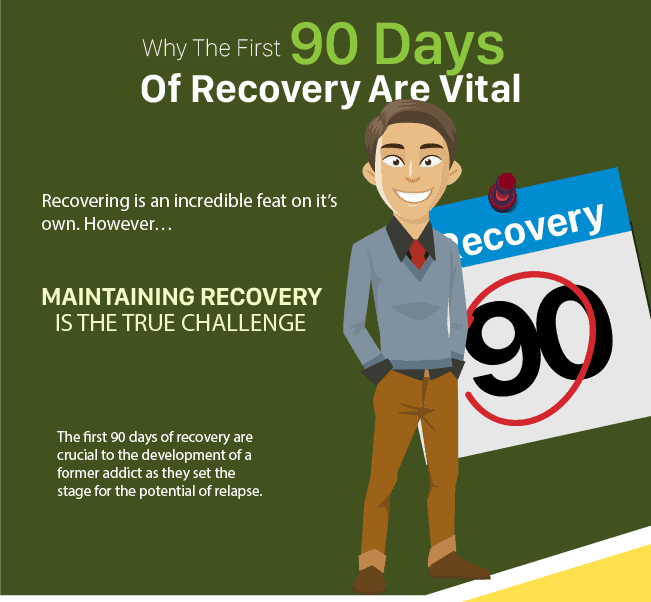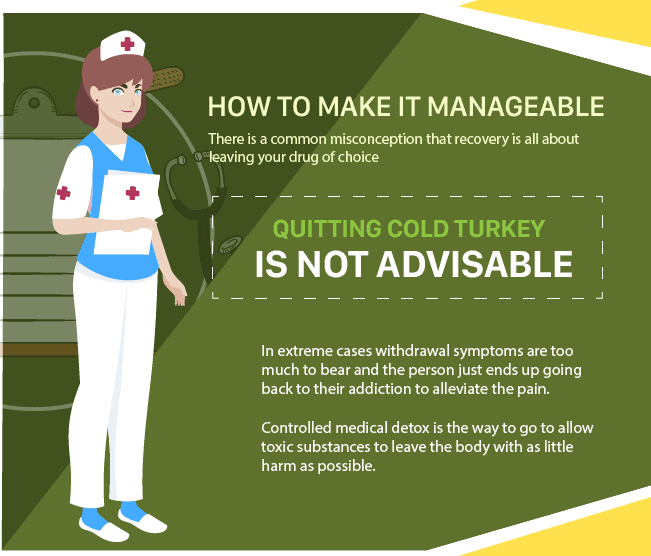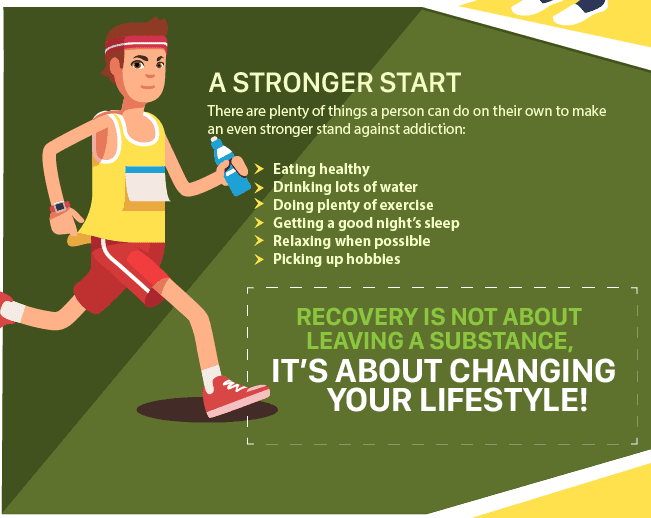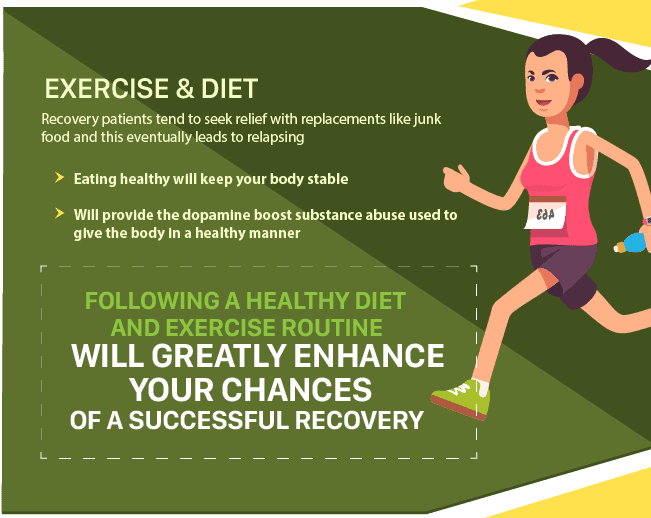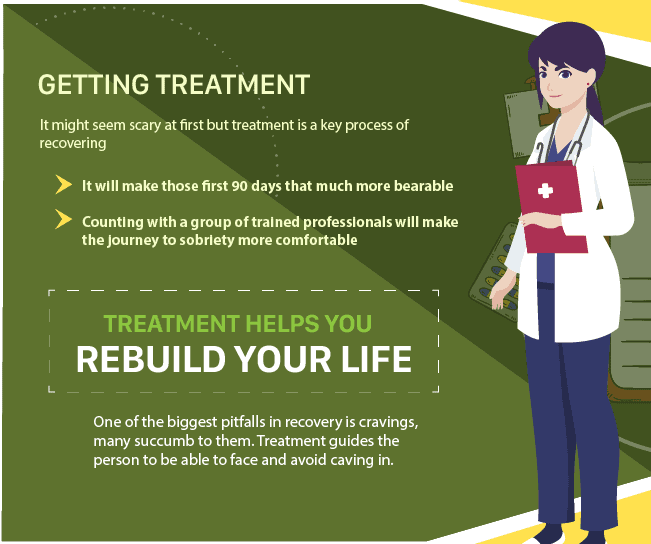The first 90 days of your recovery is unquestionably the most important part of your addiction recovery process. There just is no doubt. For starters, if your first 90 days of recovery don’t go well, you may not get to day 91. You’ll be too busy starting over again from day 1. Relapse is at its highest rate during the first three months of recovery. Everything will be at greatest risk, including your overall health. As a result, this is the time in your recovery when it is absolutely the most vital to take good care of yourself and your body. How you treat yourself during the first 90 days of your recovery will set the tone for how the rest of this process will go. We always talk about how every day gets easier as you go. The “one day at a time” mantra is everywhere in the field of addiction recovery. And it’s true. Each day is easier than the last. But the subtext of that is that the first few days are the absolute worst. That’s why so much addiction treatment is geared to the beginning of treatment. This is the time when you’ll need the most support. You may spend the first few days in detox, and you may spend a month or more in a residential addiction treatment center. When it comes to this beginning part of your recovery, it’s far better to do too much than too little. Never underestimate the power addiction has, and how much it wants to drag you back down with it. It is simply not possible to be too careful. Leaving yourself with too little support in a vulnerable moment can topple all of your hard work getting sober in just an instant. That’s why your first 90 days are so important – to set the tone that carries you through not only day 91, but also day 901.
How You Can Make Your First 90 Days a Springboard to Sobriety
Remember that the point of addiction recovery isn’t just to stop using drugs or alcohol, or whatever else you may be addicted to. Removing the substance or activity is not the goal of recovery. If that’s all you had to do to pull yourself out of addiction, then you’d hear a lot more stories about how people successfully quit cold turkey. It’s not that quitting cold turkey is impossible, but it certainly isn’t a method with a very high success rate, and for good reason. Generally, people who try to quit cold turkey find themselves going it alone and dealing with terrible withdrawal symptoms without any support, at their most vulnerable times. There’s no sugar-coating it. Withdrawals without support are absolutely miserable. Your body rebels against you, and your brain screams at you that the only way to stop it is to consume more of your substance of choice. It’s painful and impossible to ignore. In some cases, most notably alcohol withdrawals, the symptoms can be serious and require immediate medical attention. Untreated severe alcohol withdrawals can actually be fatal.
Taking Action and Getting Addiction Treatment
This isn’t about scaring you into getting treatment. The reason to get support for the beginning of your recovery journey isn’t “because you could die.” It’s simply because you’re more likely to have a happier, healthier recovery process, and you’re more likely to stay sober for longer, without relapsing. That’s because when you get help for your addiction, you’re not just getting treatment for substance abuse. You’re getting therapy and counseling for the things that trigger the impulse to use. Addiction recovery isn’t about getting you to stop drinking or using drugs. It’s about helping you reinvent a life for yourself that doesn’t involve drinking or using drugs. People think they can just slide back into their old lives and just subtract the addictive substances, and they’ll be fine. That’s not how it works. Not even a little bit. Trying to simply subtract drugs or alcohol from a life equation that’s already balanced is going to cause imbalance. That means you’re going to be overcome with cravings as you try to figure out how to fill that void. Addiction treatment is about rebuilding your life in such a way that it doesn’t feel like there’s a void to be filled. It doesn’t feel like there’s a big empty spot there, because you have all sorts of things going that you didn’t have before, like new hobbies and personal relationships. Those are the things you do in the first 90 days of recovery, and those are the things that will sustain you long after you’ve left treatment.
What You Can Do to Make Your Recovery Start Even Stronger
Much of what you’ll get in treatment is professional therapy by treatment specialists. They’re trained to help you get to the bottom of your issues and help you craft a new life that is drug- and alcohol-free. But that doesn’t mean you need to rely on them entirely. There are things you can do for yourself in the early days of your recovery that will not only improve your prospects down the line, but also make you feel better in the meantime. Some of those things include:
- eating healthy
- drinking lots of water
- getting plenty of exercise
- getting a good night’s sleep
- taking time for relaxation when necessary
- taking up new interests and hobbies
Whoops, did that sound like a total healthy lifestyle change? So it did! That’s because that’s exactly what that is. Again, you want to reformulate your life in such a way that it no longer revolves around drugs like it did before. This is part of how you do that.
Why Exercise and Diet Work in Addiction Recovery
Of course, there is some science behind why it’s important to get your body back in shape. Addicts generally don’t spend a lot of time getting exercise, and they often gorge themselves on junk food. Alcohol itself consists of a massive amount of empty calories (and sugar, depending on what you’re drinking). But holistic detox methods have shown that improving nutrition and exercise can actually speed up your body’s ability to filter out the lingering influence of drugs. Sweating helps your body flush the toxins easier. Drinking water gives your kidneys ample fuel to do the same. Meanwhile, eating a balanced diet makes your entire body function better, which kick-starts your ability to heal and recover from damage. These are also all things that provide small amounts of dopamine to your brain. As you may know, dopamine is a hormone that signals a “reward” reaction in your brain. And most forms of addiction work by flooding your brain with dopamine to the point that it’s numbed to smaller doses. This is the reason why people often lose interest in their hobbies and exhibit diminished appetite during their addictions. But doing these little things in the early stages of your recovery can help reset your brain to react properly to normal doses of dopamine. Setting that baseline early on can pay dividends later on.
Start Strong, Continue to Be Strong In Your Recovery
You simply can’t underestimate how important it is to start your recovery off on the right foot. Recovery is hard as it is, and it’s okay to need help. If anything, it’s more strange to not need help. You don’t want to start out your new sober life feeling miserable and bored. You may think you can just power through your addiction with willpower, but overcoming addiction has never been a question of willpower. It’s not about strength. It’s about understanding what’s going on in your brain and weaving a tight-knit support net to protect yourself from it. That’s what the first 90 days of recovery are about – getting support. That support will help you look ahead to the possibilities of a sober future, rather than looking behind at your past vices. As long as you’re looking ahead and moving in that direction, you can’t be stopped. But it never hurts to get yourself the help you need to keep you on that path. Sometimes it’s a winding one. Do you have any stories to share about your first three months in recovery? Let us know what went right, what went wrong, and what you would have done differently. Your story may make all the difference for someone starting their own journey of recovery.
Full Infographic:
Sources:
Sobriety coin. (2016, December 31). Retrieved May 09, 2017 10 Tips for Starting New After Addiction. (2015, January 28). Retrieved May 09, 2017

